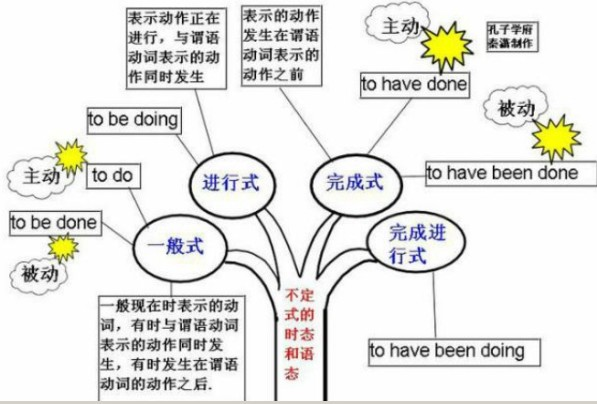本试题 “The Wenchuan earthquake in 2008 is believed _____ more than 70,000 people and made thousands homeless, _____ it perhaps the most destroying earthqu...” 主要考查您对现在分词
不定式的完成式
等考点的理解。关于这些考点您可以点击下面的选项卡查看详细档案。
- 现在分词
- 不定式的完成式
现在分词的概念:
现在分词(PresentParticiple)(又称-ing形式),是分词的一种,是非限定动词,即在句子里面不能单独充当谓语,但能充当其它的一些成分(定语,表语,补语和状语)。一般式:doing;一般被动式:being done;完成式:having done;完成被动式:having been done。所有否定式都是在-ing前面加not。
现在分词的用法:
1)做表语:
如:He was very amusing.
That book was rather boring.
很多动词的现在分词都可以作表语:exciting, interesting, encouraging, disappointing, confusing, touching, puzzling.
2)作定语:
上面所出现的现在分词都可以用作定语,修饰一个名词:
如:That must have been a terrifying experience.
I found him a charming person.
现在分词短语还可以放在名词的后面修饰名词,相当于一个定语从句:
如:There are a few boys swimming in the river.
There is a car waiting outside.
3)作状语:
现在分词短语可以表示一个同时发生的次要的或伴随的动作:
如:Following Tom, we started to climb the mountain.
Opening the drawer, he took out a box.
Taking a key out of his pocket, he opened the door.
现在分词短语还可以表示原因,相当于一个原因状语从句:
如:Not knowing her address, we couldn't get in touch with her.
Being unemployed, he hasn't got much money.
现在分词短语还可以表示时间,相当于一个时间状语从句:
如:Hearing the news, they all jumped with joy.
Returning home, he began to do his homework.
Jim hurt his arm while playing tennis.
Be careful when crossing the road.
Having found a hotel, we looked for some where to have dinner.
Having finished her work, she went home.
4)作宾补:
现在分词在一些动词之后可以做宾语的补语:
例如:see, hear, catch, find, keep, have等。
如:I see him passing my house every day.
I caught him stealing things in that shop.
I smelt something burning.
She kept him working all day.
现在分词其他用法解析:
1、现在分词一般式的用法:
现在分词的一般式所表示的动作与主语动作同时发生:
如:When we arrived, we found him sleeping. 我们到达时发现他在睡觉。
Living in the 示的动作也可略早于或迟于谓语动作,但两者之间没有时间间隔:
如:Seeing nobody at home, he decided to leave a note. 发现没有在家,他决定留个字条。
He went home, finding the door locked. 他回到家,发现门是锁着的。当现在分词所表示的动作略迟于谓语动作时,现在分词通常位于句末。
2、现在分词完成式的用法:
现在分词的完成式主要表示发生在谓语动作之前的动作:
如:Having been there once, she knew the place quite well. 由于去过那儿一次,她对那地方很熟悉。
Having failed twice, he didn't want to try again. 他已经失败了两次,不想再试了。
注:(1)现在分词的一般式和完成式均可表示已完成或先于谓语的动作,但有区别:现在分词所表示的动作虽然可以先于谓语动作,但两者之间没有时间间隔,而现在分词的完成式所表示先于谓语的动作则与谓语动作有一定的时间间隔:
如:Locking the door, he went out. 锁好门之后,他就出去了。
Having invited him here to speak, we'd better go to his lecture. 既然我们请了他来作报告,我们最好去听一下。
有时即使是分词动作与谓语动作几乎同时发生,但如果要强调分词动作的完成性,也应用现在分词的完成式:
如:Having bought our tickets, we went into the theatre. 我们买好票后就走进剧场。
(2)现在分词的完成式一般不用作定语:
误:Do you know anyone having lost a cat? 你知道有谁丢了一只猫吗?
误:I want to talk to the person having broken the window. 我想同打破窗户的人谈谈。
若将以上现分词的完成式改为一般式也不可以(因为现在分词作后置定语时通常只表示与谓语动作同时或几乎同时发生的动作,而不能先于谓语动作而发生):
误:I want to talk to the person breaking the window.
3、现在分词被动式的用法:
当要表示一个被动动作时,现在分词就用被动形式。现在分词的一般式和完成式均有被动式形式:
(1)现在分词一般式的被动式:主要表示现在正在进行的动作,也可表示与谓语动作同时发生的动作:
如:Who is the woman being operated on? 正在动手术的女人是谁?
I saw him being taken away by the police. 我看见他被警察带走。
注:有时现在分词一般式的被动式所表示的动作也可发生在谓语动作之前(此时的现在分词通常用于表示原因,且多为状态动词):
如:Not having a car, he finds it difficult to get around. 由于没车,她感到行动很困难。
(2)现在分词完成式的被动式:主要表示发生在谓语动词之前且已经完成的动作。
如:The subject having been opened, he had to go on with it. 话题已经开始了,他不得不谈下去。
Having been written inhaste, the book has many mistakes. 这书因写得仓促,所以错误不少。
比较:Being so ill, she can't go to school. 由于病得那么严重,她不能去上学。
Having been ill for a long time, he needed time to recover. 由于病了很长时间,他需要一段恢复的时间。
不定式的完成式概念:
不定式的完成式主要表示已经完成的动作—既可能是表示先于谓语动作已经完成,也可能是先于某个特定时间已经完成。
如:I am sorry to have kept you waiting. (=I am sorry that I have kept you waiting) 对不起,让你久等了。
不定式的完成式(to have+过去分词)的用法:
1、表示在主句谓语的动作之前发生的事情:
如:I'm glad to have met your parents here. 我很高兴在这儿见到了你父母(已见过)
I'm sorry to have kept him waiting for me so long. 我很抱歉让他等了我这样久。(已经等过了)
2、动词不定式的完成式和下列动词的过去时连用,表示过去没有实现的事情:plan, hope, expect, be, intend, mean,w ish,等。注意一定是它们的过去时。另外还有should/wouldlike/love。这个结构表示“本打算/想/计划…”的意思。
例如:The game were to have taken place in Room. 比赛原计划在罗马举行。
He planned to have gone abroad last week.=He planned to go abroad but he didn't. 他原计划上周出国的。
I'd like to have been offered the job and(to have been)given the opportunity to prove myself. 我真想(当时)把这个工作给了我,给我个机会让我证明我自己。
同样的意思也可用上述动词的过去完成时加动词不定式的一般式来表达。
例如:I had hoped to visit the great pyramid.
=I hoped to have visited the great pyramid.
=I hoped to visitit, but I didn't. 我本希望参观大金字塔的。
They would have liked to have your help.
=They would like to have had your help.
=They wanted to have your help but they didn't have it. 他们本想得到你帮助的。
动词不定式时态知识体系:

不定式完成式的三点用法说明:
(1)表示发生在谓语动作之前的动作。
如:He seems to have caught a cold. 他似乎感冒了。
I hate to have quarreled with her. 我后悔和她吵架了。
I'm sorry to have given you so much trouble. 对不起给了你这么多麻烦。
(2)表示在某个给定的时间之前已完成的动作。
如:I hope to have finished the work by now. 我希望现在以前已完成这项工作。
(3)表示过去未曾实现的想法和愿望。
如:I should like to have come earlier. 我本想早点来的。
We were to have been married last year. 我们本来打算去年结婚的。
与“The Wenchuan earthquake in 2008 is believed _____ more th...”考查相似的试题有:
- Su Lijie, 39-year-old female graduate of Peking University’s graduate school ended up ____as a house painter back in ...
- ______ for a few days, the thirsty and hunger soldiers had to give in at last.A.Being surroundedB.SurroundingC.Hav...
- Driving past the crossroads, I found a little girl ____ on the sidewalk crying.[ ]A. lyingB. layingC. to lieD. to be ...
- ______ the project in time, the staff are working at weekends.A.CompetingB.Having completedC.CompletedD.To complete
- The crowd cheered wildly at the sight of Liu Xiang, who was reported ______ the world record in the 110-meter hurdle ...
- I don’t allow ______ in my office and I don’t allow my family ______ at all.A.to smoke…smokingB.smoking…to smokeC....
- She wanted to use the ____money to buy her husband a present for the coming Christmas.[ ]A. remainedB. remainingC. le...
- 短文改错。此题要求改正所给短文中的错误。对标有题号的每一行做出判断:如无错误,在该行右边横线上画一个勾(V);如有错误...
- , they went to bed earlier than usualA.There was nothing more to doB.They have nothing more to doC.Having nothing ...
- ________ the stomachache, he couldn't fall asleep.[ ]A. Suffered fromB. SufferedC. Suffering fromD. Suffering